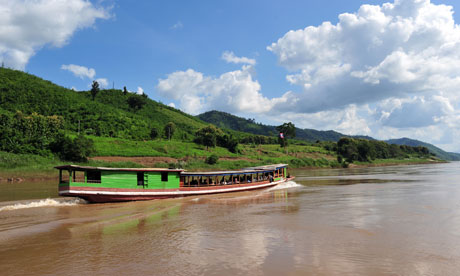In a reporter’s notebook, Tyler Chapman examines how grassroots
activists in Burma are fighting an uphill battle against environmental
degradation, corruption, and Chinese influence.
Grassroots environmentalists have quietly become a force for change
in Burma, with one major accomplishment on the books but daunting
challenges ahead.
For years, from backstreet offices and often alone, as if
underground, they have worked to protect the country’s environment
against what they see as an onslaught of avarice and corruption fueled
mostly by China.
There have been successes along the way, including a ban on the large
plastic bags that were choking cities and towns across the country, but
nothing like what happened in September.
When Burma’s new president, Thein Sein, announced on Sept. 30 that he
was “listening to the people” and suspending work on a Chinese dam on
the upper Irrawaddy River, it was celebrated by environmentalists as
their biggest victory ever.
Certainly in the previous half century of military dictatorship, the
government had never bent so dramatically to the wishes of activists of
any kind. Activists who took to the streets often found themselves in
jail, and still do.
But included in the chorus of opposition to the Myitsone dam was the
voice of Aung San Suu Kyi, the heroine of the pro-democracy movement in
Burma. When she met the president for the first time after her release
from house arrest, the dam was on her agenda.
A 'tipping point'?
Whether Thein Sein’s decision was more a rebuff to China than it was a
bow to environmentalists and Suu Kyi is open to question. But it
validated the activists’ efforts and gave them hope that perhaps they
had found a friend at the highest level.
Win Myo Thu, one of Burma’s most outspoken environmentalists, told me
the president’s decision could herald an environmental “tipping point”
under the new, nominally civilian government.
“In addition,” he said, “there are serious steps being taken in
parliament and on the administrative level for taking the environment
into consideration in economic planning.”
Those steps include the drafting of new environmental laws with input
from local and foreign experts alike. But, once passed, will those laws
be enforced?
No, Win Myo Thu said, not unless Burma can weed out the corruption
that accelerated environmental degradation under the old military
regime. This, he said, will require a determined effort to educate the
public and, especially, government officials.
“There’s an opening now for environmental democracy,” he said. “Our
job is to bring community grassroots efforts to a higher level … to
educate low-level technocrats and work up the chain from there. We have
to use the media. We have to be patient. We can’t push too much or the
hardliners will push back.”
Vanishing forests
Coincidentally, the new government is professing a commitment to the
environment. Twice during my recent visit, the government’s New Light of
Myanmar newspaper ran editorials espousing responsible environmental
stewardship. And the government co-sponsored a conference on green
growth, with Suu Kyi in attendance.
What are the environmental issues facing Burma as it moves into what could be the greatest economic boom in its history?
“You’re dealing with greed,” Win Myo Thu said.
A littered stream in Sittwe, western Burma, is but one example of the country's problem with solid waste, October, 2011. RFA
According to the Burma Environmental Working Group, the country’s
forests are disappearing at the rate of at least 75 soccer fields an
hour, or more than one per cent a year. The World Resource Institute
says Burma is the fourth leading contributor to global warming via
deforestation, behind Indonesia, Brazil, and Malaysia.
The clear-cutting of pristine teak forests has left hundreds of
square miles of devastation in northeast Burma. Many of the giant logs
were trucked to nearby China. Others were barged down the Irrawaddy
River en route to India and Thailand. Now, according to environmental
groups, the teak is mostly gone and reforestation efforts are mired in
corruption. The loggers have turned to smaller hardwood trees.
In southeast Burma, along the border with Thailand, almost a million
acres of rare lowland rain forest have been cleared, or are targeted for
clearing, to make way for oil palm plantations, most of them run by
cronies of the former military regime or by Chinese investors.
Pressure on the forest comes also from a growing rural population
that needs land for farming and wood for housing, heat, and cooking.
Unchecked mining for gold, copper, tin, and precious stones, spearheaded
by Chinese operators and investors, scars the landscape and pollutes
rivers with extractive chemicals.
Burma’s biodiversity is at stake with the traffic of wildlife to
China to feed that country’s appetite for exotic animals, dead or alive.
The air in Rangoon, Mandalay, and regional capitals is fouled by
diesel fumes, dust, and smoke from cooking and garbage fires. For the
most part, water is unsafe to drink without treatment, especially in
rural areas where rivers, lakes, and estuaries serve as both toilet and
water source. And garbage litters the countryside for someone else to
pick up.
It all adds up to a daunting task for environmentalists. But they are
taking the president’s suspension of the Myitsone dam project as
encouragement.
“Never underestimate one small thing,” Win Myo Thu said. “It could have a snowball effect.”
Tyler Chapman just returned from his sixth trip to Burma in the past five years.
Source: http://www.rfa.org/english/commentaries/environmentalists-12072011132353.html


